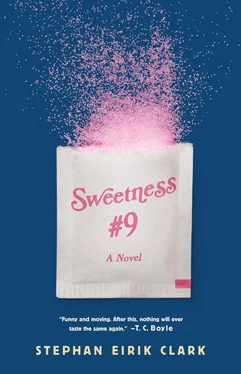I took her place in front of the fridge, not sure if I wanted a snack or a meal. I’d had a late lunch. “The missionaries? Fat,” I said. “Obese even.”
She said something in response, but I could barely hear it over the sound of her chopping off the ends of the cucumber.
“I hardly think you can call me a fascist simply for pointing out the truth.”
“A FAT ist,” she said. “I said you’re such a fatist. You are familiar with the term, aren’t you?”
“Not exactly, no.” Ernest and Jeremiah entered from the hallway. “But I am glad to hear you didn’t align me with the politics of National Socialism. We take what we can get, I suppose.”
“What does their weight have to do with anything? That’s all I’m saying. Maybe it’s genetic.”
“Oh, please.” I closed the refrigerator door and crossed into the pantry for something salty. “Is this the conversation stopper they’re teaching you in school these days? Because tell me, why has the obesity rate been on the rise only these last ten years? Have aliens come down and fiddled with our DNA? Given us all newer, fatter genes? No.”
I stepped out with a bag of potato chips and spoke as if addressing the missionaries. “What happened was we won the Cold War and got soft. That’s the truth of it. To celebrate our victory, we gorged ourselves on sweets and junk food. Lost any sense of discipline. Don’t scoff. We’d be better off facing the truth than letting it fester. You only encourage more of the same if you do.”
“You are so blind,” Priscilla said.
“If anything, I should’ve told those boys what I’m telling you. They won’t convert the former Eastern Bloc looking like that. Or tell me, would you have trusted this Jesus chap if he were morbidly obese?”
Ernest and Jeremiah stood in front of the microwave, watching something inside spin round and round. Here, my son looked back at me over his shoulder.
“That’s right,” I said. “If he were four hundred and twenty-three pounds and sweating in the midday sun? You know the type. Sweat shorts and a pair of flip-flops, always breathing through his mouth.” I lifted my arms at the elbows, and did it for effect. Jeremiah grinned, no longer drooling.
“You are so juvenile,” Priscilla said.
“Yes, the guy who fills up his Super Big Gulp at the fountain and then has a quick sip and tops it off again? This is your spiritual superstar? No. If you really wanted to help, you’d say enough with the water into wine and all the fish you can eat, there’s something to be said for moderation and a good run around the block. Do some knee bends, why don’t you. Yes?”
Priscilla swept a mound of cucumber coins onto a plate and turned, pointing her knife at me. “If I were you, I wouldn’t feel so comfortable. You’re the one making all the flavors these Mormons can’t resist.”
“Me? I’m not holding them down. I’m not telling them to drive a Buick instead of getting on a bike. Personal responsibility. I may have wandered politically over the years, may have fallen for those who use a good pie chart and whatnot, but I still believe in personal responsibility.”
“Then tell me”—she quartered a tomato with two efficient thwap s—“what are the most popular flavors for snack foods?”
I’d been struggling to open my bag of chips — pulling at them, drying my hands, trying again — but here I tossed them onto the counter, saying they should store nuclear waste in these things.
“C’mon, Dad. I know you know this.”
I looked at her. “What?” Had she been reading one of the trade magazines I left in the bathroom downstairs?
“Let me remind you, then. Those that overwhelm the taste buds and disappear almost immediately. Sounds a little like the digestive equivalent of crack, doesn’t it?”
“Priscilla.” I grabbed the chips. “Priscilla, I know this is not the era of Father Knows Best, but did you just compare me to a drug dealer?”
“Crunch all you want, we’ll make more!”
“And what would you have us do? Return to the days of the Commissar of the Commissary?”
“When the revolution comes—”
“Oh, please!”
“—what are you going to say? I was only filling orders?”
Betty came back from the garage holding a box of Lean Cuisine. “Salmon!” she said, hoisting the entrée high over her head in both hands, as if she were the archbishop of Canterbury approaching the pulpit with The Word of God.
I bumped out past her, muttering as I moved through the utility room.
“Only filling orders!” I said.
At my workbench, I grabbed a screwdriver from the pegboard organizer and stabbed at my bag of chips. Tsssssh! Such a wonderful sound, that rushing release of air, but fleeting, too, the pleasure all too fleeting.
I sat on my stool and stuffed my mouth, chewing, muttering, unable to leave this behind me. When I’d calmed down some, I reached for a small metal figurine and pulled a mounted magnifying glass round toward me. I had my paints, brushes, and a little dish of water nearby, right where I’d left them the night before. Modeling. I’d first lost myself in the hobby when I was living in England and my father would return from the office in London with one of the kits then popular with young boys: RAF bombers and German Panzer divisions, Aston Martins and Rovers and the Queen Mary. I must have pieced together and painted nearly every plastic part they sold, but none with the same all-consuming passion that I’d give a diorama the summer that my father moved us to New Jersey. Then, at the onset of puberty, in a new country without the comfort or companionship of a friend or foe, I escaped my longing to be back in my mother’s England by re-creating the Normandy Invasion on my bedroom floor. I focused on Utah Beach, though with a slightly ahistorical eye. Along with the barges spilling their troops and the planes hanging from overhead wires, I placed one more group of Allied soldiers beneath the threat of the Germans in their pillboxes above: the 3032nd Mobile Baking Division, with whom my father landed on this beach on D-Day+24. The Fighting Quartermasters hunkered down behind their mobile kitchen, eager to move on toward Berlin and start pumping out sixty thousand pounds of battlefield bread each day.
Following that diorama, I built still more: “Winter at Valley Forge,” “The Retreat (1812),” and “Victory at Yankee Stadium,” commemorating the Baltimore Colts’ stunning world championship of 1958. But in college I gave it all up after my roommate looked at me strangely when I told him I was thinking of doing the Lincoln-Douglas debates. I had only returned to the hobby this summer, but already I had completed a small Cro-Magnon scene (“The Discovery of Fire”) and another that paid tribute to one of Genghis Khan’s brave warriors, that unknown man who, after riding for hours across the lonely steppe, had overturned his shield on the coals of his company’s fire and created, first to the amusement and then the delight of his fellows, the world’s first Mongolian barbecue.
This evening I was working on the scene of Nicolas Appert’s moment of triumph, when he stood in his food-splattered kitchen in the French countryside, sinking a glass bottle of partridge, vegetables, and gravy into a tub of scalding-hot water. He lived during the Age of Revolutions, when military conflicts were so frequent and so large that you could no longer hope to feed your troops with food culled from the surrounding villages. “An army marches on its stomach,” Napoleon had famously said, before offering a prize of twelve thousand francs to anyone who could devise a method of food preservation that’d allow his soldiers to eat fresh rations no matter how far from Paris his ambitions carried them. Appert — a brewer, a baker, and a pickle maker — was the one to lay claim to this money. He did not understand how his bottled foods kept scurvy, malnutrition, and starvation at bay; we’d have to wait for Pasteur to explain all of that. But his intuitive leap was no less remarkable, as from it grew the modern canning industry, a development that drew a distinct line between the rot and rancid days of the Middle Ages and the prolonged life and improved health of the modern world.
Читать дальше












